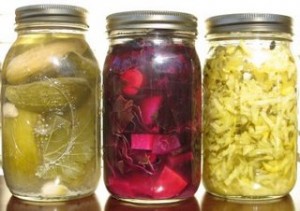It’s very recent that fermented foods have begun to disappear from our plate. Modern pickles and sauerkraut are made with vinegar instead of the traditional method of lacto-fermentation using salt. Bread and pasta are made with commercial yeast instead of being naturally leavened with wild yeast (sourdough). Wine, beer and cheeses are being pasteurized — killing off all the good bacteria we so desperately need to maintain health.
But there are many advantages to going back to the traditional ways of our ancestors, and eating more fermented foods.
1. Fermented foods improve digestion.
Fermenting our foods before we eat them is like partially digesting them before we consume them. According to Joanne Slavin, a professor in the Department of Food Science and Nutrition at the University of Minnesota, “…sometimes people who cannot tolerate milk can eat yogurt. That’s because the lactose (which is usually the part people can’t tolerate) in milk is broken down as the milk is fermented and turns into yogurt.”
2. Fermented foods restore the proper balance of bacteria in the gut.
Do you suffer from lactose intolerance? Gluten intolerance? Constipation? Irritable bowel syndrome? Yeast infections? Allergies? Asthma? All of these conditions have been linked to a lack of good bacteria in the gut.
3. Raw, fermented foods are rich in enzymes.
Your body needs [enzymes] to adequately digest, absorb, and utilize the nutrients in your food. As you age, your body’s supply of enzymes goes down.
4. Fermenting food actually increases the vitamin content.
Fermented dairy products show an increased level of folic acid which is critical to producing healthy babies as well as pyroxidine, B vitamins, riboflavin and biotin depending on the strains of bacteria present.
5. Eating fermented food helps us to absorb the nutrients we’re consuming.
You can ingest huge amounts of nutrients, but unless you actually absorb them, they’re useless to you. When you improve digestion, you improve absorption.
6. Fermenting food helps to preserve it for longer periods of time.
Milk will go bad in the fridge but kefir and yogurt last a lot longer. Sauerkraut, pickles and salsa will keep for months. And if you’ve got a huge batch of produce in your garden that you don’t know how to use up — ferment it!
7. Fermenting food is inexpensive.
There’s nothing fancy required for this hobby. And many of the foods required to make these recipes are very cheap. You can use inexpensive cabbage to make sauerkraut, or get yourself a kombucha scoby and with just pennies’ worth of water, sugar and tea, you’ve got a health elixir slash soda pop.
8. Fermenting food increases the flavor.
There’s a reason humans enjoy drinking wine and eating stinky cheese. There’s a reason we like sauerkraut on our hot dogs and salsa on our tortilla chips. It tastes good!
For additional information, visit our website at www.detoxforlife.biz.
To schedule your next treatment contact us directly at (480) 949-6570

